新视野大学英语第一课教案
新视野大学英语1读写教案
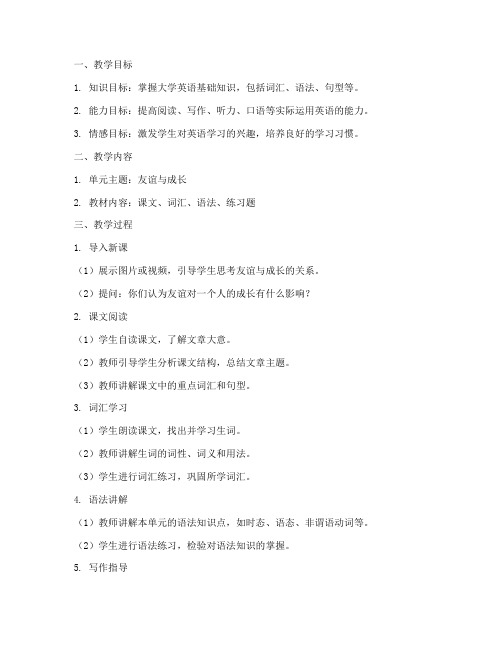
一、教学目标1. 知识目标:掌握大学英语基础知识,包括词汇、语法、句型等。
2. 能力目标:提高阅读、写作、听力、口语等实际运用英语的能力。
3. 情感目标:激发学生对英语学习的兴趣,培养良好的学习习惯。
二、教学内容1. 单元主题:友谊与成长2. 教材内容:课文、词汇、语法、练习题三、教学过程1. 导入新课(1)展示图片或视频,引导学生思考友谊与成长的关系。
(2)提问:你们认为友谊对一个人的成长有什么影响?2. 课文阅读(1)学生自读课文,了解文章大意。
(2)教师引导学生分析课文结构,总结文章主题。
(3)教师讲解课文中的重点词汇和句型。
3. 词汇学习(1)学生朗读课文,找出并学习生词。
(2)教师讲解生词的词性、词义和用法。
(3)学生进行词汇练习,巩固所学词汇。
4. 语法讲解(1)教师讲解本单元的语法知识点,如时态、语态、非谓语动词等。
(2)学生进行语法练习,检验对语法知识的掌握。
5. 写作指导(1)教师讲解写作技巧,如段落结构、句型运用等。
(2)学生根据所学内容,完成一篇短文写作。
(3)教师批改作文,指出学生写作中的错误,并进行讲解。
6. 听力训练(1)播放与课文内容相关的听力材料。
(2)学生听后回答问题,检验听力效果。
(3)教师讲解听力技巧,提高学生听力水平。
7. 口语练习(1)学生分组进行口语练习,如角色扮演、讨论等。
(2)教师巡视指导,纠正发音和语法错误。
8. 总结与反馈(1)教师总结本节课的重点内容,回顾所学知识。
(2)学生反馈学习心得,提出疑问。
四、教学评价1. 学生对课文内容的理解程度。
2. 学生对词汇、语法知识的掌握情况。
3. 学生写作、听力、口语能力的提高情况。
五、教学反思1. 适时调整教学策略,提高教学效果。
2. 关注学生的学习需求,因材施教。
3. 创设良好的学习氛围,激发学生学习兴趣。
新视野大学英语第三版教案unit1课件
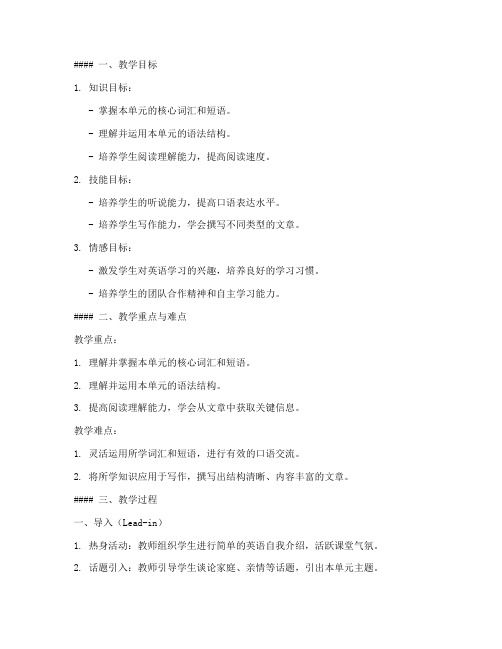
#### 一、教学目标1. 知识目标:- 掌握本单元的核心词汇和短语。
- 理解并运用本单元的语法结构。
- 培养学生阅读理解能力,提高阅读速度。
2. 技能目标:- 培养学生的听说能力,提高口语表达水平。
- 培养学生写作能力,学会撰写不同类型的文章。
3. 情感目标:- 激发学生对英语学习的兴趣,培养良好的学习习惯。
- 培养学生的团队合作精神和自主学习能力。
#### 二、教学重点与难点教学重点:1. 理解并掌握本单元的核心词汇和短语。
2. 理解并运用本单元的语法结构。
3. 提高阅读理解能力,学会从文章中获取关键信息。
教学难点:1. 灵活运用所学词汇和短语,进行有效的口语交流。
2. 将所学知识应用于写作,撰写出结构清晰、内容丰富的文章。
#### 三、教学过程一、导入(Lead-in)1. 热身活动:教师组织学生进行简单的英语自我介绍,活跃课堂气氛。
2. 话题引入:教师引导学生谈论家庭、亲情等话题,引出本单元主题。
二、课文讲解(Text Explanation)1. 词汇讲解:教师讲解本单元的核心词汇和短语,并举例说明其用法。
2. 语法讲解:教师讲解本单元的语法结构,并举例说明其在课文中的应用。
3. 阅读理解:教师带领学生阅读课文,分析文章结构,提炼关键信息。
三、口语练习(Oral Practice)1. 小组讨论:学生分组讨论课文内容,分享自己的观点和感受。
2. 角色扮演:学生分组进行角色扮演,模拟课文中的场景,提高口语表达能力。
四、写作练习(Writing Practice)1. 写作指导:教师指导学生如何撰写文章,包括文章结构、写作技巧等。
2. 范文展示:教师展示优秀范文,供学生参考。
3. 学生写作:学生根据所学知识,撰写短文。
五、课堂小结(Summary)1. 回顾所学内容:教师引导学生回顾本节课所学知识,巩固所学内容。
2. 布置作业:教师布置相关作业,帮助学生巩固所学知识。
#### 四、教学资源1. 教材:《新视野大学英语第三版》2. 辅助材料:多媒体课件、词汇卡片、语法练习册等3. 网络资源:在线词典、英语学习网站等#### 五、教学反思本节课通过多种教学手段,帮助学生掌握了本单元的核心词汇、语法结构和阅读技巧。
新视野大学英语1课文教案

课程名称:《新视野大学英语1》教材版本:外语教学与研究出版社教学对象:大学一年级英语学习者教学目标:1. 理解课文内容,掌握文章主旨和细节。
2. 培养学生的阅读理解能力,提高词汇和语法水平。
3. 增强学生的英语听说能力,提高跨文化交际意识。
4. 培养学生自主学习的能力,提高英语学习的兴趣。
教学重点:1. 课文内容的理解与分析。
2. 词汇和语法的运用。
3. 阅读技巧的训练。
教学难点:1. 复杂句型的理解和运用。
2. 词汇的积累与运用。
3. 阅读速度的提升。
教学准备:1. 教材《新视野大学英语1》。
2. 多媒体教学设备。
3. 课件、词汇卡片等辅助教学材料。
教学过程:一、导入(5分钟)1. 复习上一节课的内容,检查学生的掌握情况。
2. 通过提问或讨论,引导学生思考本节课的主题。
二、课文阅读(15分钟)1. 学生自读课文,了解文章大意。
2. 教师引导学生找出文章的主题句,分析文章结构。
3. 学生朗读课文,注意语音、语调的准确性。
三、课文分析(20分钟)1. 分析文章的主旨和细节,引导学生思考作者的观点。
2. 讨论文章中的关键句子,分析其语法结构和词汇用法。
3. 结合生活实际,引导学生举例说明文章中的观点。
四、词汇和语法练习(15分钟)1. 教师讲解重点词汇和语法点,帮助学生理解和运用。
2. 学生完成相关练习,巩固所学知识。
五、课堂讨论(10分钟)1. 学生分组讨论课文内容,分享自己的观点和感受。
2. 教师引导学生进行互动,提高学生的口语表达能力。
六、总结与作业布置(5分钟)1. 教师对本节课的内容进行总结,强调重点和难点。
2. 布置课后作业,要求学生完成相关练习,巩固所学知识。
教学反思:1. 关注学生的学习进度,及时调整教学策略。
2. 注重培养学生的阅读兴趣,提高学生的阅读能力。
3. 加强学生的口语训练,提高学生的跨文化交际能力。
4. 注重培养学生的自主学习能力,激发学生的学习兴趣。
课后作业:1. 复习本节课的课文内容,整理重点词汇和语法点。
大学英语第一课教案
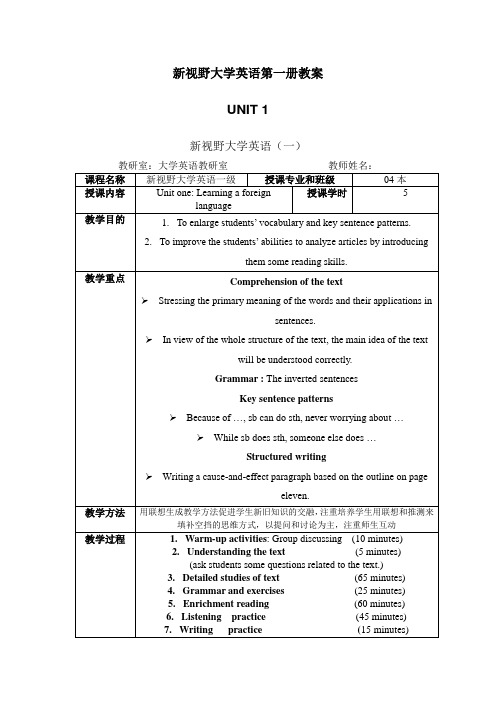
1.Vocabulary
2.Structure
3.Translation
Enrichment reading:
Elicit questions from the students, practice fast reading skills, focus on difficult sentences and cultural notes and improves students’ self-learning abilities.
Step 2:Ask the representatives of 2 or 3 groups to report the result of their discussion to the class.
2).Class discussion:
Summarize the answers to these questions.
6.Virtual:almost what is stated; made up
e.g The king was so much under the control of his wife that she was the
virtual leader of the country.
mitment:a promise to follow certain beliefs or certain course of actions
e.g Far from angry, he’s very happy.
e.g Her husband is far from handsome, he’s very ugly.
新视野大学英语第三版教案unit1
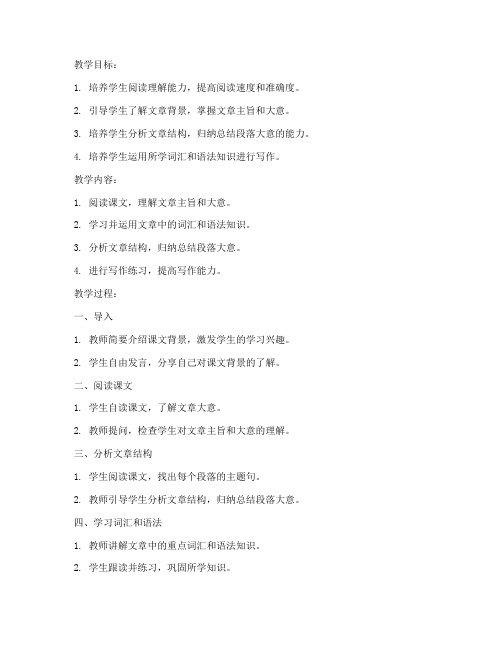
教学目标:1. 培养学生阅读理解能力,提高阅读速度和准确度。
2. 引导学生了解文章背景,掌握文章主旨和大意。
3. 培养学生分析文章结构,归纳总结段落大意的能力。
4. 培养学生运用所学词汇和语法知识进行写作。
教学内容:1. 阅读课文,理解文章主旨和大意。
2. 学习并运用文章中的词汇和语法知识。
3. 分析文章结构,归纳总结段落大意。
4. 进行写作练习,提高写作能力。
教学过程:一、导入1. 教师简要介绍课文背景,激发学生的学习兴趣。
2. 学生自由发言,分享自己对课文背景的了解。
二、阅读课文1. 学生自读课文,了解文章大意。
2. 教师提问,检查学生对文章主旨和大意的理解。
三、分析文章结构1. 学生阅读课文,找出每个段落的主题句。
2. 教师引导学生分析文章结构,归纳总结段落大意。
四、学习词汇和语法1. 教师讲解文章中的重点词汇和语法知识。
2. 学生跟读并练习,巩固所学知识。
五、写作练习1. 教师给出写作题目,要求学生运用所学知识进行写作。
2. 学生独立完成写作,教师巡视指导。
六、课堂小结1. 教师总结本节课所学内容,强调重点和难点。
2. 学生回顾所学知识,提出疑问。
七、课后作业1. 复习课文,掌握文章主旨和大意。
2. 预习下一课,为下一节课做好准备。
教学评价:1. 课堂表现:观察学生在课堂上的发言、互动情况,评价其学习态度和参与度。
2. 阅读理解:通过提问、讨论等方式,评价学生对文章主旨和大意的理解程度。
3. 词汇和语法:通过学生的跟读、练习,评价其对词汇和语法知识的掌握程度。
4. 写作能力:通过学生的写作练习,评价其写作能力。
教学反思:1. 本节课是否达到了教学目标?2. 学生在课堂上的表现如何?3. 教学方法是否合适?4. 如何改进教学效果?备注:1. 教师应根据学生的实际情况调整教学内容和进度。
2. 注重培养学生的阅读兴趣和自主学习能力。
3. 鼓励学生积极参与课堂活动,提高课堂氛围。
新视野大学英语1教案U1
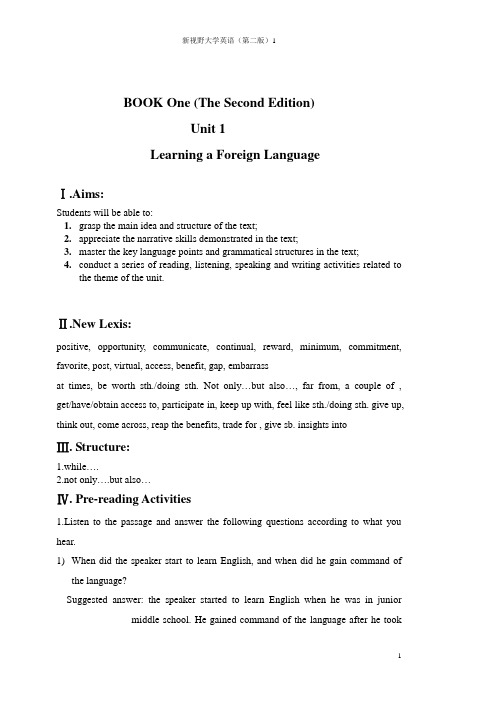
BOOK One (The Second Edition)Unit 1Learning a Foreign LanguageⅠ.Aims:Students will be able to:1.grasp the main idea and structure of the text;2.appreciate the narrative skills demonstrated in the text;3.master the key language points and grammatical structures in the text;4.conduct a series of reading, listening, speaking and writing activities related tothe theme of the unit.Ⅱ.New Lexis:positive, opportunity, communicate, continual, reward, minimum, commitment, favorite, post, virtual, access, benefit, gap, embarrassat times, be worth sth./doing sth. Not only…but also…, far from, a couple of , get/have/obtain access to, participate in, keep up with, feel like sth./doing sth. give up, think out, come across, reap the benefits, trade for , give sb. insights intoⅢ. Structure:1.while….2.not only….but also…Ⅳ. Pre-reading Activities1.Listen to the passage and answer the following questions according to what you hear.1)When did the speaker start to learn English, and when did he gain command ofthe language?Suggested answer: the speaker started to learn English when he was in junior middle school. He gained command of the language after he tookEnglish through an online course.2.)Besides the language itself, what else did the speaker gain from learning a foreign language online?Suggested answer: Online learning has taught the speaker to better manage his time so that he could include his online studies in his busyschedule. Learning better time management has paid manyrewards since.3)How could online learning help you with your English?(open-ended)Suggested answer:To provide enough information;To avoid embarrassment when I can‟t answer questions inclassroom;To study at my own pace;………….2. Warming-up1) When and where did you begin to learn English?— I began to learn English... years ago.— I have learned English for...— My experience with English began in... when...2) Do you enjoy learning English? Why?—No, I don‟t enjoy it because it is useless / toodifficult.— Yes, I enjoy it very much. It can help mefind a good job after graduation.learn the cultures of other countries.make some foreign friends.learn the value of hard work.3) How was your English teacher in junior or senior middle school?— My English teacher in... waskind/patient/encouraging/strict/impatient/cold/always angry.4) Do you have any trouble learning English? If any, what is it?understand what others say.remember so many words.understand the grammar.read quickly.speak in public.— I always feel it difficult to...—It‟s not easy for me to…5) What are the advantages of learning English online?equal opportunity to do...any place, any time or pacecheaper and more convenientquicker and easier to get access tomuch information and to teachersstudent-centeredno limit to the number of students...Ⅴ. Background Information:T he education systems seem similar for different countries, but we use different terms to describe them. A junior middle school refers to a school in the US for children who are twelve to fifteen years old while in Britain a junior school refers to a school for children aged seven to eleven years. In China, a junior middle school refers to a stage of education after primary or elementary school, and a senior middle school refers to a stage of education after primary or elementary school, and a senior middle school refers to a stage of education after junior middle school and before college or university. More information about the Us education system is available in the following paragraphs.Most Americans attend twelve years of primary and secondary school. With a secondary school diploma or certificate, a student can enter college, university, vocational school and other professional schools.Primary and secondary school: Begins around age six for US children. They attend five or six years of primary school. Next they go to secondary school, which consists of either a two-, three-year program or a four-year program. This is called “middle school”or “junior high school”and “senior high school”(often just called “high school”).Higher education: after finishing high school, US students may go on to college or university. College or university study is known as “higher education”.Study at a college or university leading to the Bachelor‟s Degree is known as undergraduate education. Study beyond the Bachelor‟s Degree is known a graduate or postgraduate education. M.D and Ph. D. are both doctorate degrees, awarded todoctors of medicine and doctors of philosophy respectively.StageⅠPresentationIntroductory remarksThe author presents readers with his own language learning experiences at different stages. And at different stages, the author met different teachers and consequently formed different attitudes towards English learning.A.Vocabulary1.reward:vt. Give something in return for good and valuable doings.The teacher rewarded the student for his high scores.Our hard work was finally rewarded.n. something as a return for good and valuable doings.This game had its excitement, challenges, and rewards.rewarding : a. satisfying and worthwhileTeaching is a rewarding career.reward sb. with sth.; reward sb. for sth;2. frustrate: vt.1) cause someone to have feelings of disappointmentShe was frustrated by her failure in the college entrance exam.2)cause the failure of somethingThick fog frustrated their attempt to land on the tiny island.frustrating: a. making someone feel annoyed, upset, or impatientIt‟s frustrating when you‟re in a hurry and the traffic isn‟t moving.frustration. n. the feeling of being disappointed, annoyed, or upset.a sense of frustration3. junior:be junior toseniorsuperiorFreshman, sophomore, junior, senior,4.positive: a.1)helpful and encouraging in achieving somethingif you want to improve your situation you must adopt a positive attitude.2)definite; allowing no room for doubtThe boss must be positive before making a decision about whether these workers should be fired.5.former: a. of an earlier periodthe former president / wifen. the first of the two people or things just mentionedGiven the choice between a piece of chocolate and a book, most will choose the former.Of the two possibilities, the former seems more likely.6.access: n.1)(U) the right to have or use somethingIf you do not have access to the Internet, we‟ll send someone to help you.2)(C) the means of entering a place.The soldiers guarded the only access to the building.get/ have /obtain access to: have the right to have or use somethingYou obtain access to your data by typing in a user name and password.7.participate (in)Members can participate in any of the activities organized by the club.mitment:1)(U) the hard work and loyalty that someone gives to an organization, activity,etc.It‟s a part-time program, but total commitment is still necessary for completing it.2)(C) a promise to follow certain beliefs or actions.He made a commitment to help all children learn English, but he soon found it impossible without an online course.9. embarrass: vt. make someone feel ashamed, nervous, or uncomfortableThe others embarrassed her when they laughed at her mistake.Being unable to answer the questions embarrassed some students. embarrassing: a. making someone feel ashamed, nervous, or uncomfortable.It was embarrassing that I couldn‟t remember his name.10. reap: vtReap the benefits (of hard study)Reap the rice in the field.reap the benefit/reward/profit/fruit of11. insight: n. (C.U) an accurate or deep understanding of somethingWe help troubled students gain some insight into their own problems.gain insight into sth了解,洞悉12. communicate:vi. Send and exchange feelings, opinions, or information.Now that we live in different cities, we communicate by email.We communicate with each other using sign language.vt. make opinions, feelings, or information known or understood by others.She communicated her feelings to her teacher.13. gap:bridge the gap: reduce or get rid of the difference between two things.Learning a foreign language helps us bridge the gap between two different cultures. The policy bridged the gap between the poor and the rich.14. be worth sth./doing sth: be rewarding enough for the time, effort, money, etc.He‟s decided to have a look at the house for it is well worth buying.15. far from: not…at all; rather thanFar from being angry, he‟s very happy.Far from helping the situation, you‟ve just make it worse.16. trade for: exchange forHe decided to trade his goat for rice.I would trade my dictionary for your book.17. now that: because of something or as a result of something.Now that all has arrived , we can begin our class.18. instead of: rather thanI feel like staying home alone instead of going out shopping with friends.You should be out for fresh air instead of staying indoors all day.19. reach out to: communicate with; contactWith the introduction of the internet, we can reach out to our friends by email. Compare:1)reach out for: try to getYou must reach out for any opportunity that comes your way.2)reach for: hold out one‟s hand to get somethingHe reached for the phone and dialed the number.B.Text Study1.Part Division of the Text2. Structure AnalysisA.General Statement + Specific Details + Conclusion1)What is the General Statement?2)What are the specific details?3)What is the conclusion?The General Statement (the Main Idea)Learning a foreign language was one of the most difficult yet most rewarding experiences of my life.(Para.1)The Specific DetailsEnglish Learning Experiences:Difficult : a. in senior middle school. (Para. 3)b. at college. (Para.4 )Rewarding :a. in junior middle school (Para. 2)b. with the online course. ( Paras.5—7 )ConclusionLearning a foreign language has been a most trying experience for me, but one that I wouldn‟ t trade for anything. (Para. 8)B. The way to develop paragraphs:cause and effectThe cause and effect technique can make clear the reasons why something happens by showing the relation between cause and effect.List the cause and effect of Para. 2, 3, and 4.Para. 2Cause: The kind and patient teacher often praised the students.Effect: I eagerly answered questions, not worrying about making mistakes. I was at the top of my class.Para. 3Cause: The new teacher quickly punished those who gave wrong answers.Effect: I lost my eagerness to answer questions and my desire to say anything in English.Para. 4Cause: Large classes made me only able to answer a couple of questions in each class period. Many students spoke much better than I did.Effect: I was afraid to speak. My English seemed to stay at the same level.3.Difficult sentences1)Learning a foreign language was one of the most difficult yet most rewarding experiences of my life. (Para.1)Paraphrase:learning a foreign language was one of the most difficult things I‟v ever done, but it provided more benefits than any other experience Ihave had.2)While my former teacher had been patient with all of the students, my new teacher quickly punished those who gave incorrect answers. (Para.3)Paraphrase: my junior middle school teacher had been patient with all the students, but my new teacher was impatient and quick to punish those who gavewrong answers.While: conj. used to introduce information which contrasts with information in the main clauseWhile…, 而……,Eg.(1) While I like you personally, I don‟t think what you are doing is right.(2)While professors are talking about economic theories, company chairmen areconcerned with profits.“TranslationI drink black coffee while he prefers cream in his coffee.While most students look forward to learning English online, some cannot bear the thought.3)it didn‟t take me long to lose my eagerness to answer questions. (Para.3) Paraphrase: After a short time, I was no longer eager to answer questions.4)Not only did I lose my joy in answering questions, but I also lost my desire to sayanything at all in English.(Para.3)Paraphrase: I lost my joy in answering questions, and I also lost my desire to say anything at all in English.W ith “not only” or“only” placed at the beginning of a sentence, its order should be inverted (倒装).More:neither/little/only/hardlyseldomneither/not… nornot untilunder no circumstancesno sooner... than...scarcely (hardly)... when...Practice(1)We have been told that under no circumstances ____ the telephone in the office for personalaffairs.A. may we useB. we may useC. we could useD. did we use(2)The organization had broken no rules, but _____ had it acted responsibly.A. neitherB. soC. eitherD. both(3) I could not persuade him to accept it, _____ make him see the importance of it.A. if only I could notB. or I could notB. nor could I D. no more than I could(4) Only under special circumstances _______ to take make-up tests.A. are freshmen permittedB. freshmen are permittedC. permitted are freshmenD. are permitted freshmen(5) Not until the game had begun ______ at the sports ground.A. had he arrivedB. would he have arrivedC. did he arriveD. should he have arrived5)I soon got access to the necessary equipment, learned how to use the technologyfrom a friend and participated in the virtual classroom 5 to 7 days a week. (Para.5) Paraphrase: I got the right to use the necessary equipment, learned how to use the technology from a friend, and took part in the online classroom 5 to 7days a week.6)Once in a while I cried out of frustration, and sometimes I felt like giving up.(Para.7)Paraphrase: Sometimes I cried because of disappointment and sometimes I wanted to stop trying.7)But I didn‟t feel intimidated by students who spoke faster than I did because Itook all the time I needed to think out my ideas and wrote a reply before posting it on the screen (Para.7)Paraphrase:But I didn‟t feel frightened by students who spoke faster than I did, because I took all the time I needed to think carefully and I wrote myreply before I put it on the screen.8)Learning a foreign language has been a most trying experience for me, but onethat I wouldn‟t trade for anything. (Para.8)Paraphrase:leaning a foreign language has been an experience full of difficulties and challenges, but I wouldn‟t exchange it for anything else.9)Now that I speak a foreign language, instead of staring into space when English isbeing spoken, I can participate and make friends. (Para.8)Paraphrase: because I can speak a foreign language, I am able to take part in English conversations and make friends, and I no longer look thoughtlessly intothe distance when people around me are speaking English.StageⅡReproductionSuppose you are the author. Work with your partner to talk about your experiences of learning English at different stages in time sequence. Remember to use the information you learned from the text.A sample beginningA: When did you begin to learn English?B: I began to learn English at the age of 12 when I was in junior middle school. How about you?StageⅢSummaryLearning a foreign language was one of the most difficult yet most rewarding experiences. Although at times, learning a language was frustrating, it was well worththe effort. In junior middle school, my foreign teacher praised all of the students. I benefit a lot from this positive teaching method. In senior middle school, the teacher always punishedthose who gave incorrect answers. So I lost my joy in answering questions and my desire to sayanything at all in English. In college, I had no opportunity to speak in class. I felt intimidated. Online learning changed everything. Although it requires much time commitment and discipline to keep up with the flow of the course, I succeeded in foreign language learning. Learning a foreign language has been a most trying experience. I have learned insights into another culture as well as the language points. StageⅣHomework1)To ask students to be familiar with the text again and memorize the new words and phrases.2) Students should be ready for dictation about the key words and sentences.3) Finish the exercises in Unit 1.4) Teacher may assign Ss to do …Translation‟ on p. 12.5) Useful expressions值得……的well worth the effort积极的方法positive method前一任老师former teacher遇到生词come across new words网络课程online course虚拟课堂virtual classroom课程进度the flow of the course得到好处reap the benefits of茫然不解stare into space参与participate in6) Multiple Choic e①The people living in these apartments have free ____ to that swimming pool.A. assessB. excessC. processD. access②The two friends haven‟t ______ with each other.A. associatedB. wroteC. communicatedD. heard③If you get up early and run every day, you will ______ a lot from it.A. profitB. benefitC. deriveD. receive④Teachers have free _______ to the library.A. accuseB. accessibleC. accessD. approach⑤You can learn anything with a _______attitude.A. positiveB. constructiveC. negativeD. sensitive⑥High interest rates _______ people fromborrowing money.A. frustrateB. discourageC. disappointD. disturb⑦He felt _________ when he found he haddifficulty with most of the math problem.A. frightenedB. terrifiedC. encouragedD. frustrated⑧Why can‟t you do this small _____ for me? I‟ve helped you often in the pas t.A. favoriteB. favorableC. favorD. demand⑨His attitude to work mainly depends on ______ from the work.A. the offerB. the awardC. the rewardD. the reflection⑩The students were participating _________ an international energy-saving competition between towns in New England and Canada.A. forB. toC. inD. at7)Writing—Cause and Effect WritingWrite a paragraph of about 80 words, using the 5 patterns.Topic: English StudyGeneral Statement: I want to study English for different reasons.For your referenceWriting—Cause and Effect WritingI want to study English for different reasons. Firstly, English is generally considered as the most common language of communication throughout the world. For example, English is widely used in many fields such as science, business, entertainment, just to name a few. Therefore, learning English enables me to have the opportunity to communicate with people from different backgrounds and cultures. Secondly, learning English broadens my horizon, giving me insights into other cultures. And my mind is opened to new ways of viewing things.。
新视野大学英语1教案
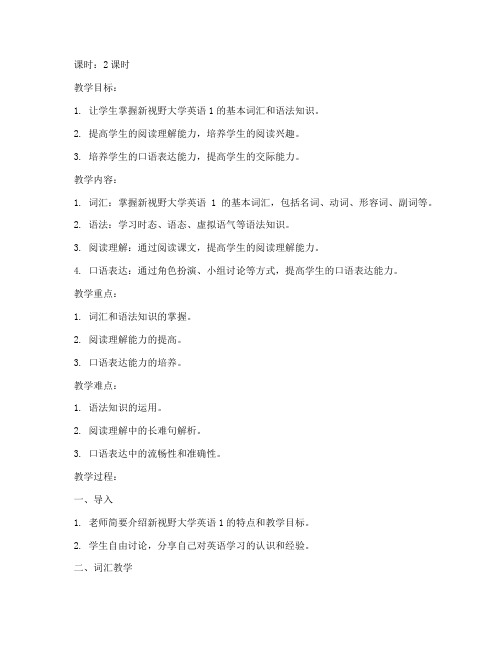
课时:2课时教学目标:1. 让学生掌握新视野大学英语1的基本词汇和语法知识。
2. 提高学生的阅读理解能力,培养学生的阅读兴趣。
3. 培养学生的口语表达能力,提高学生的交际能力。
教学内容:1. 词汇:掌握新视野大学英语1的基本词汇,包括名词、动词、形容词、副词等。
2. 语法:学习时态、语态、虚拟语气等语法知识。
3. 阅读理解:通过阅读课文,提高学生的阅读理解能力。
4. 口语表达:通过角色扮演、小组讨论等方式,提高学生的口语表达能力。
教学重点:1. 词汇和语法知识的掌握。
2. 阅读理解能力的提高。
3. 口语表达能力的培养。
教学难点:1. 语法知识的运用。
2. 阅读理解中的长难句解析。
3. 口语表达中的流畅性和准确性。
教学过程:一、导入1. 老师简要介绍新视野大学英语1的特点和教学目标。
2. 学生自由讨论,分享自己对英语学习的认识和经验。
二、词汇教学1. 老师带领学生复习上节课的词汇,并进行新词汇的讲解。
2. 学生通过游戏、练习等方式巩固所学词汇。
三、语法教学1. 老师讲解时态、语态、虚拟语气等语法知识。
2. 学生通过例句、练习等方式理解和运用所学语法知识。
四、阅读理解1. 老师带领学生阅读课文,并讲解课文内容。
2. 学生完成阅读理解练习,老师讲解答案和解析。
五、口语表达1. 学生进行角色扮演,模拟课文中的场景。
2. 学生分组讨论,就课文内容发表自己的观点。
3. 老师点评学生的口语表达,给予指导和建议。
六、课堂小结1. 老师总结本节课所学内容,强调重点和难点。
2. 学生回顾所学知识,提出疑问。
七、作业布置1. 完成课后练习题。
2. 复习本节课所学词汇和语法知识。
3. 预习下一节课的内容。
教学评价:1. 课堂参与度:观察学生在课堂上的积极性和参与度。
2. 作业完成情况:检查学生的课后作业完成情况。
3. 考试成绩:通过考试检验学生对本节课所学知识的掌握程度。
新视野大学英语1unit1教案
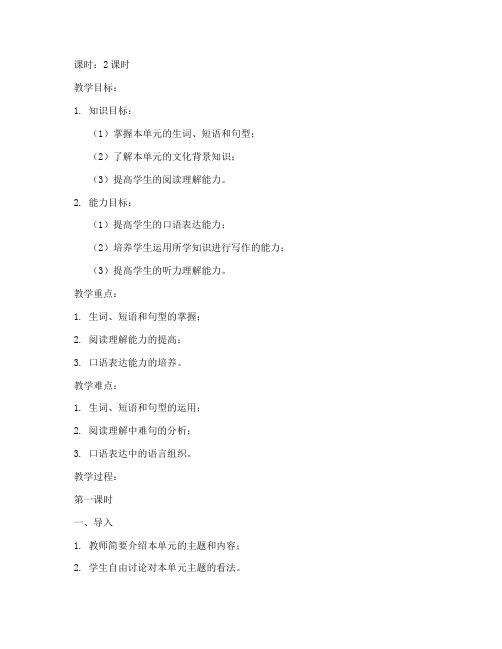
课时:2课时教学目标:1. 知识目标:(1)掌握本单元的生词、短语和句型;(2)了解本单元的文化背景知识;(3)提高学生的阅读理解能力。
2. 能力目标:(1)提高学生的口语表达能力;(2)培养学生运用所学知识进行写作的能力;(3)提高学生的听力理解能力。
教学重点:1. 生词、短语和句型的掌握;2. 阅读理解能力的提高;3. 口语表达能力的培养。
教学难点:1. 生词、短语和句型的运用;2. 阅读理解中难句的分析;3. 口语表达中的语言组织。
教学过程:第一课时一、导入1. 教师简要介绍本单元的主题和内容;2. 学生自由讨论对本单元主题的看法。
二、生词、短语和句型教学1. 教师带领学生逐一学习本单元的生词、短语和句型;2. 学生跟读、默写,巩固记忆;3. 教师讲解重点词汇、短语和句型的用法。
三、课文阅读1. 学生自读课文,理解大意;2. 教师引导学生分析课文中的难句,讲解语法知识;3. 学生朗读课文,巩固语音、语调。
四、课堂活动1. 教师组织学生进行小组讨论,分析课文中的文化背景知识;2. 学生分享自己的观点,提高口语表达能力。
第二课时一、复习1. 教师带领学生复习上一节课的生词、短语和句型;2. 学生跟读、默写,巩固记忆。
二、阅读理解1. 学生自读课文,完成阅读理解练习;2. 教师讲解阅读理解中的难题,分析解题技巧;3. 学生分享自己的阅读心得。
三、口语表达1. 教师组织学生进行角色扮演,模拟课文中的场景;2. 学生运用所学知识进行口语表达,提高语言组织能力。
四、写作1. 教师讲解写作技巧,指导学生完成写作任务;2. 学生运用所学知识进行写作,提高写作能力。
五、课堂小结1. 教师对本节课的学习内容进行总结;2. 学生分享自己的学习心得。
教学评价:1. 学生对生词、短语和句型的掌握程度;2. 学生在阅读理解、口语表达和写作方面的进步;3. 学生对课堂活动的参与度和积极性。
- 1、下载文档前请自行甄别文档内容的完整性,平台不提供额外的编辑、内容补充、找答案等附加服务。
- 2、"仅部分预览"的文档,不可在线预览部分如存在完整性等问题,可反馈申请退款(可完整预览的文档不适用该条件!)。
- 3、如文档侵犯您的权益,请联系客服反馈,我们会尽快为您处理(人工客服工作时间:9:00-18:30)。
教案2016 ~2017 学年度第一学期课程名称大学英语学时学分 70学时4.5学分专业班级授课教师系部外语系本课程教学总体安排课程名称:大学英语课程性质与类型:公共必修课总学时、学分:70学时,4.5学分教学目的与要求:1.通过本学期的学习,使学生进一步加强基础知识。
2.扩大词汇量,熟悉并掌握大学英语教学大纲中规定的单词、词组和结构的用法,达到大学英语一级的水平及要求。
3.进一步提高学生的听力、阅读及写作技巧。
4.进一步加强学生的语言实际应用能力,尤其是听说能力和篇章理解分析能力。
教材及参考书目:1. 《新视野大学英语》(第三版)读写教程(第1册第1单元—第8单元)2.《新视野大学英语》(第三版)听说教程(第1册第1单元—第8单元)3. 《新视野大学英语》(第三版)教师用书4.《新视野大学英语》(第三版)配套光盘5. 牛津英汉双解词典考核方式及成绩计算方法:综合成绩=期末成绩*60%+听力成绩*15%+读写成绩*10%+平时成绩*15%课程教学日历课程名称:大学英语授课学期:2016-2017学年第一学期第一章教学安排的说明章节题目:Book 1 Unit 1 Fresh startText A Toward a brighter future for all学时分配:8本章教学目的与要求(分了解、熟悉、掌握三个层次):一、了解课文有关的背景知识二、熟悉文章的中心思想和篇章结构三、熟悉文中所体现的记叙技巧四、掌握大学英语教学大纲中规定的单词和词组及其搭配五、掌握文中所包含的主要语法结构:其它:课堂教学方案课题名称、授课时数:大学英语、8课时授课类型:理论课、技法课、习题课教学方法与手段:讲授、讨论、指导、多媒体等教学目的要求:Students should be able to1. grasp he main idea and structure of the text;2. give reasons when they do the ranking activities and make predictions;3. master the key language points and grammatical structures in the text;4. conduct a series of reading, listening, speaking and writing activities related to the theme of the unit.教学重点、难点:1重点:核心词汇及短语、句型结构等语言点(Master the key language points and grammatical structures in the text)2难点:语言特点的分析第1、2学时:授课类型:多媒体加讲解教学方法与手段:领读、自读、多媒体、讲解、举例讲解教学目的要求:一、了解课文有关的背景知识二、熟悉文章的中心思想和篇章结构三、熟悉文中所体现的记叙技巧四、掌握大学英语教学大纲中规定的单词和词组及其搭配五、掌握文中所包含的主要语法结构教学重点、难点:1重点:核心词汇及短语、句型结构等语言点2难点:语言特点的分析教学内容及组织安排:一、朗读Text A出现的生词和短语(朗读10分钟)二、引导讲解和Text A有关的背景知识(多媒体讲解 10分钟)1. What is the ideal university like in your eyes?2. What are your expectations of your college life?三、讲解Text A 课文内容,并结合Text A课文内容,讲解核心词汇及短语、句型结构等语言点(多媒体举例讲解 80分钟)1. 生词表中的词汇及短语2. 用于表达“某人在特定身份下做某事的感受”。
As …, sb. is proud /happy/ sorry/sad… to do sth.3. 用于表达“某人认定的最为重要的建议”。
If sb. could give sb. else only onepiece of advice about…, it would be this: Do sth!4. 用于列举“最典型的事例”。
… A wonderful example of this is sb. who…/ sth.that…5. 认知并使用排比句课堂练习或讨论、布置作业:1.拟留课后作业和小组思考。
1)Do you think a university education can change a person’s life? In what way and why?2)How do you think of those successful people such as Bill Gates who dropped out of university?3)What are you going to do at university in order to sample widely and challenge yourself?2.预习尚未讲解的课文内容。
小结:通过课文的学习,第一,了解了跟Text A有关的背景知识;第二,学生在词汇量方面有所增加,并掌握了大纲规定的四级词汇用法。
第3、4学时:授课类型:讲解及举例说明教学方法与手段:讲解、举例、口头练习教学目的要求:一、熟悉大学英语教学大纲中规定的单词和词组二、掌握文中所包含的主要语法结构教学重点、难点:1重点:核心词汇及短语、句型结构2难点:语言特点的分析及词汇搭配能力分析教学内容及组织安排:继续讲解Text A 课文内容,并结合Text A课文内容,讲解核心词汇及短语、句型结构等语言点(举例讲解 100分钟)课堂练习或讨论、布置作业:拟留作业和写作题:如何写排比句。
小结:通过本课的学习,学生进一步巩固了大纲规定的四级词汇,了解到英语的习惯搭配是掌握英语词汇不可忽视的。
学生能够运用排比句,并有效练习英文排比句写作。
第5、6学时:授课类型:理论课教学方法与手段:多媒体、讲解、提问、提问、查找教学目的要求:一、掌握大学英语教学大纲中规定的单词和词组及其搭配,掌握文中所包含的主要语法结构二、熟悉文章的中心思想和篇章结构三、熟悉文章的写作特点四、写作技巧:如何写总分总形式的英语段落。
教学重点、难点:1重点:篇章结构和写作特点2难点:写作技巧的掌握教学内容及组织安排:一、听Text A课文录音,边听边默跟读(5分钟)二、继续讲解Text A 课文内容,并结合Text A课文内容,讲解核心词汇及短语、句型结构等语言点(举例讲解 45分钟)三、中心思想和篇章结构(15分钟)Main idea: The text is a speech made by a university president to the freshmen. The text can be divided into 3 parts:Part I (Paras 1─3): The president congratulates students on their achievement and reminds students of the fact that their current success was due to their own and their parents’ efforts, and that their future is built on a solid foundation of the past.Part II (Paras 4─7): The president offers students comprehensive advice on how to make the most of their four college years and makes them realize the university’s expectations and their own responsibilities.Part III (Paras 8): The students are called upon to cherish the opportunity and to bear in mind their responsibilities, their country and the world.四、熟悉文章的写作特点(15分钟)1. A paragraph often starts with a topic sentence: A paragraph often starts witha topic sentence, which expresses the main idea of the paragraph. The topic sentence is generally followed by specific details to support and explain the main idea. Sometimes this kind of paragraph may end with a concluding sentence to summarize the paragraph or leave the reader with something to think about.2. Parallelism: By placing two or more ideas of equal value in the same grammatical form enables us to express these ideas clearly and emphatically. For example, in Para.3, there is a sentence: You may have cried tears of joy to be finally finished with high school; your parents may have cried tears of joy to be finally finished with doing your laundry.五、结合Text A讲解写作技巧:如何写总分总形式的英语段落(15分钟)六、回答学生问题(5分钟)课堂练习或讨论、布置作业:拟留作业和思考题:Vocabulary: I; Comprehensive Exercises I, II; Paragraph Writing; Text B.小结:通过本次学习,第一,学生对篇章结构有了进一步的理解;第二,从理论上基本掌握了总分总形式的英语段落写作方面的技巧。
